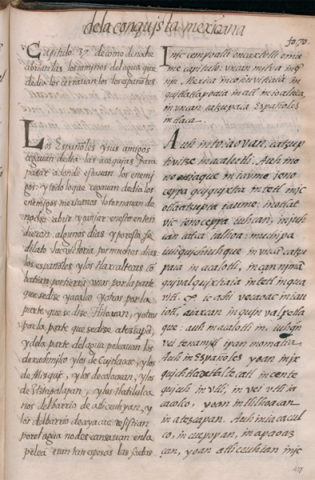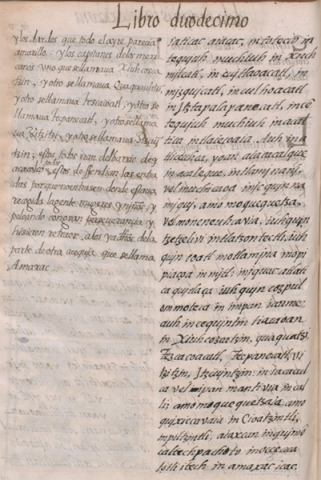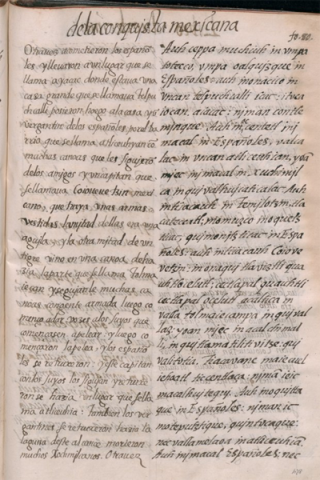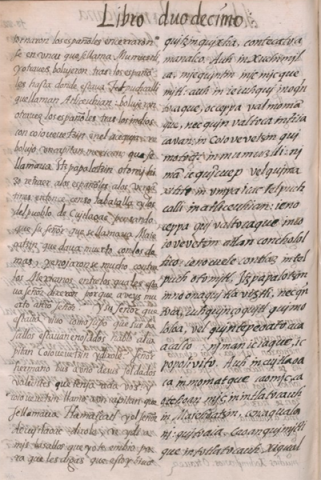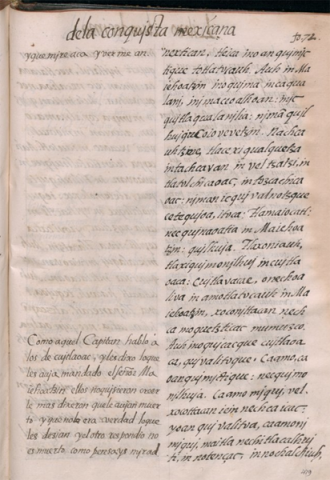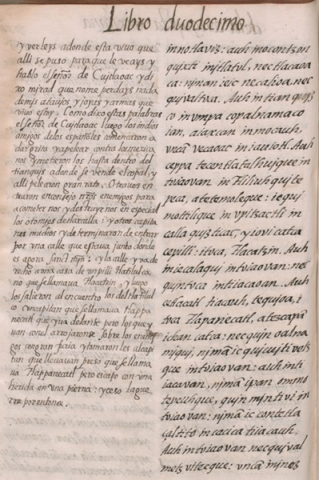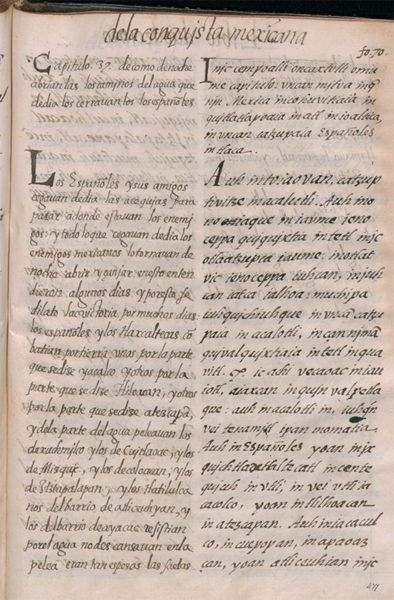 |
[Transcription of the Nahuatl (right-hand column) by James Lockhart:]
[f. 70r.] Inic cempoalli oncaxtolli omume capitulo: vncan mitoa in q̄nin Mexica in cohuvitiaia in quitlatlapoaia in atl in ioaltica, in vncan catzupaia Españoles in tlaca.
Auh in toiaovan, catzuptivitze in acalutli. Auh in onoiaque* in iavme ie no ceppa quiquixtia in tetl inic otlaatzupca iaume: in otlatvic ie no ceppa iuhcan, in iuhcan catca ialhoa: muchipa iuh quichiuhque in vncā catzupaia in acalotli, in çan nimā quivalquixtiaia in tetl in quavitl .&. ic achi vecaoac in iauiotl, aiaxcan in quinvalpetlaque: auh in acalotli in, iuhq̄n vei tenamitl ipan momatia.
Auh in Españoles yoan in ixquich tlaxcaltecatl incentequiuh in vtli, in vei vtli iacacolco, yoan in tlilhoacan in atezcapan. Auh in iacaculco, in cuepopan, in apaoazcan, yoan atliceuhian inic
----------
*ONOIAQUE. Read "oniaque."
|
[Translation of the Nahuatl (right-hand column) by James Lockhart:]
Thirty-seventh chapter, where it is said how the Mexica kept making it hard for the Spaniards to pass, by night opening up the water [of the canals] where the Spaniards had filled them in by day.
And our enemies came filling in the canals. But when the enemy had gone, [the Mexica] again removed the stone with which the enemy had filled them in. When dawn came, things were just as they had been the day before. They always did this where [the Spaniards] had filled in the canals, immediately taking back out the stone, wood, etc. In this way the war took somewhat longer, and the Spaniards were slow in breaking through them. These canals were considered to be like great walls.
The Spaniards and all the Tlaxcalans were jointly responsible for the road, the highway to Yacacolco and to Tlilhuacan and Atezcapan. And Yacacolco [itself], Cuepopan, Apahuazcan, and Atliceuhyan,
[Translation of the Spanish (left-hand column) by James Lockhart:]
Chapter Thirty-seven, of how at night they opened the waterways that the Spaniards closed by day.
By day the Spaniards and their friends filled in the canals in order to get to where the enemy was, but by night the Mexica enemies opened up and dug out again everything they had filled in during the day. They were at this for several days, and for this reason victory was long delayed.
On land the Spaniards and the Tlaxcalans would do combat, some in the area called Yacacolco, others in the area called Tlilhuacan, and others in the area called Atezcapan. On the water those of Xochimilco, Cuitlahuac, Mizquic, Colhuacan, and Itztapalapan did battle.
The Tlatelolca of the districts of Atliceuhyan and Ayacac fought back on the water, never resting from the battle. The arrows
|
[Translation of the Nahuatl into Spanish by Fr. Bernardino de Sahagún; transcription of the Spanish (left-hand column) by James Lockhart:]
[f. 70r.] Capitulo .37. de como de noche abrianlas* los caminos del agua que de dia los cerrauanlos** los españoles.
Los Españoles y sus amigos cegauan de dia las acequias para pasar a donde estauan los enemigos: y todo lo que cegauan de dia los enemigos mexicanos lo tornauan de noche abrir y çanjar en esto entendieron algunos dias y por esto se dilato lac*** victoria por muchos dias:
los españoles y los tlaxcaltecas cōbatian por tierra vnos por la parte que se dize yacalco y otros por la parte que se dize Tliloacan, y otros por la parte que se dize atezcapā, y de la parte del agua peleauan los de xuchmilco y los de Cuitlaoac, y los de Mizquic, y los de coloacan, y los de Itztapalapan,
y los tlatilulcanos del barrio de atliceuhyan, y los del barrio de ayacac resistian por el agua no descansauan en la pelea eran tan espesas las saetas
----------
*ABRIANLAS. The element "las" is superfluous and incorrect in normal grammar.
**CERRAUANLOS. The text has "los" both before and after the verb, much as in the case at fol. 69r. above.
***LAC. For "la."
|
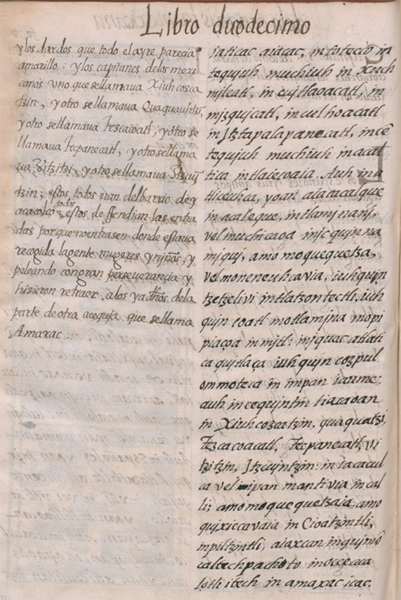 |
[Transcription of the Nahuatl (right-hand column) by James Lockhart:]
[f. 70v.] iaticac aiacac, in totecco intequiuh muchiuh in xuchmilcatl, in cuitla oacatl, in mizquicatl, in culhoacatl in Itztapalapanecatl, incētequiuh muchiuh in acaltica in tlaiecoaia.
Auh in atliceuhca, yoan aiacacalque in acaleque, in tlaminani, vel muchicaoa inic quinnamiqui, amo moquequetza, vel moneneuhcavia, iuhquin tzetzelivi in tlatzontectli, iuhquin coatl motlamina mopipiaçoa in mitl: in iquac atlatica quitlaça iuhquin cozpul ommoteca in impan iaume:
auh in cequintin tiacaoan in Xiuhcozcatzin, quaquatzi, Tezcacoacatl, Tecpanecatl, Vitzitzin, Itzcuintzin: in iacaculca vel ipan mantivia in calli; amo moquequetzaia, amo quixiccavaia in Cioatzintli, in piltzintli, aiaxcan in quimōcaltechpachoto in oc ce acalotli itech in amaxac icac.
|
[Translation of the Nahuatl (right-hand column) by James Lockhart:]
going to Ayacac and Totecco, were made the responsibility of the people of Xochimilco, Cuitlahuac, Mizquic, Colhuacan, and Itztapalapan; it was their joint responsibility to give battle in boats there.
And the boatmen and archers of Atliceuhyan and Ayacac made great efforts to encounter [the Spaniards], they lost no time, they were equal to them. It seemed that barbed darts showered down; the arrows came in large bunches, <as when a serpent strikes>. When they threw darts with the atlatl, a yellow mass seemed to spread over the enemy.
Some of the warriors of Yacacolco, whose houses were right there—the Tezcacoacatl Xiuhcozcatzin, the Tecpanecatl Quaquatzin, Huitzitzin, and Itzcuintzin— lost no time. They did not abandon the women and children. With difficulty they pressed [the Spaniards] back to another canal at Amaxac.
[Translation of the Spanish (left-hand column) by James Lockhart:]
and darts were so thick that the whole sky seemed yellow.
The captains of the Mexica, one of whom was called Xiuhcozcatzin, another Quaquauhtzin, another Tezcacoatl, another Tecpanecatl, another Huitzitzin, and another Itzcuintzin, who were all from the district of Yacacolco, defended the entryways so they would not come in where the women and children had taken refuge, and battling with great perseverance they made the above-mentioned retreat in the direction of another canal, called Amaxac.
|
[Translation of the Nahuatl into Spanish by Fr. Bernardino de Sahagún; transcription of the Spanish (left-hand column) by James Lockhart:]
[f. 70v.] y los dardos que todo el ayre parecia amarillo:
y los capitanes de los mexicanos vno que se llamaua Xiuhcozcatzin, y otro se llamaua Quaquauhtzī, y otro se llamaua Tezcacoatl, y otro se llamaua Tecpanecatl, y otro se llamaua Vitzitzi, y otro se llamaua Itzcuītzin; estos todos eran del barrio de yacacolco todos estos deffendian las entradas por que no entrasen donde estaua recogida la gente mugeres y niños, y peleando con gran perseuerancia y hizieron retraer a los ya đħos de la parte de otra acequia que se llama Amaxac.
|
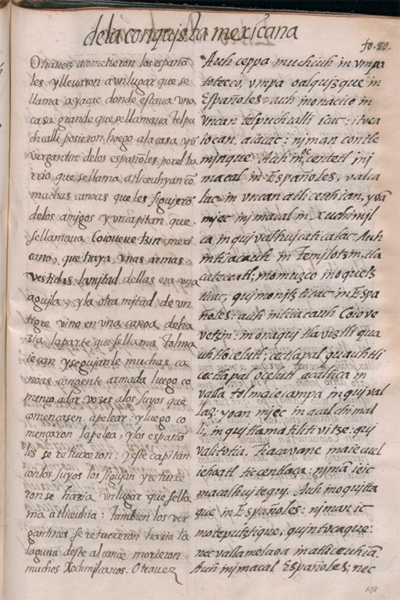 |
[Transcription of the Nahuatl (right-hand column) by James Lockhart:]
[f. 71r.] * Auh ceppa muchiuh in vmpa totecco, vmpa oalquizque in Españoles: auh in onacico in vncan telpuchcalli icac: itocaiocan. aiacac: niman contleminque.
Auh in oc centetl in imacal in Españoles, valcalac in vncan atliceuhian, yoā miec in imacal in xuchimilca in quivalhuicaticalac. Auh in tiiacauh in Temilotzin, tlacateccatl; momuzco in oquetzticac, quimonitzticac in Españoles: auh in tiiacauh Coiovevetzin: in onaqui tlaviztli quauhtlocelutl; cectlapal quauhtli cectlapal ocelutl acaltica in valla tolmaiecampa in quivallaz: yoan miec in acalchimalli, in quitlamatilitivitze: quivalitotia. Tiacavane ma ie cuel iehoatl ticcentlaça: nimā ie ic macalhuitequi. Auh in oquittaque in Españoles: niman ic moteputztique, quintocaque: nec vallamelaoa in atliceuhiā. Auh in imacal Españoles: nec
----------
*FOL. 71. Erroneously numbered 80 in the manuscript.
|
[Translation of the Nahuatl (right-hand column) by James Lockhart:]
Once it happened that the Spaniards appeared at Totecco, and when they got to where the youths’ house stood, at the place called Ayacac, they set fire to it.
And another of the Spaniards’ boats came into Atliceuhyan, and many boats of the Xochimilco people came in along with it. And the warrior Temilotzin, the Tlacateccatl, stood up on an altar platform facing the Spaniards. And the warrior Coyohuehuetzin, who had put on an eagle-jaguar device, eagle on one side and jaguar on the other, came in a boat from the direction of Tolmayeccan to repulse them. Many war boats accompanied him. He came saying, “Oh warriors, up and at them, let’s all get going!” Then they all ran to their boats. And when the Spaniards saw them, they retreated. [The Mexica] pursued them, coming straight to Atliceuhyan. Then the Spaniards withdrew their boats
[Translation of the Spanish (left-hand column) by James Lockhart:]
Again the Spaniards attacked and reached a place called Ayacac, where there is a large house called a telpochcalli; they set fire to the house.
One of the Spaniards' brigantines was going through the district called Atliceuhyan with many canoes of the friends following it. A Mexica captain called Coyohuehuetzin, who had on some insignia that were half an eagle and the other half a tiger, came in a canoe toward the place called Tolmayeccan, many canoes full of armed men following him. Then he began to shout to his followers to begin to fight; then the battle began, and the Spaniards withdrew. This captain with his followers pursued them, and they withdrew toward a place called Atliceuhyan. The brigantines also withdrew toward the lake. In this pursuit many Xochimilca died. Another time
|
[Translation of the Nahuatl into Spanish by Fr. Bernardino de Sahagún; transcription of the Spanish (left-hand column) by James Lockhart:]
[f. 71r.]* Otra uez acometieron los españoles y lleuaron a vn lugar que se llama ayacac donde estaua vna casa grande que se llamaua Telpuchcalli posieron hoego a la casa
y v̄ vergantin de los españoles por el barrio que se llama atliceuhyan cō muchas canoas que les siguierō de los amigos y vn capitan que se llamaua Coioueuetzin mexicano, que traya vnas armas vestidas la mitad dellas era vna aguila, y la otra mitad de vn tigre vino en vna canoa de hazia la parte que se llama Tolmaiecan y seguianle muchas canoas con gente armada luego començo a dar vozes a los suyos que començasen a pelear: y luego començaron la pelea, y los españoles se retruxeron: y este capitan con los suyos los siguian** y retruxeronse hazia vn lugar que se llama atliceuhia: Tambien los vergantines se retruxeron hazia la laguna deste alcance morieron muchos Xochmilcanos. Otra uez
----------
*FOL. 71. Erroneously numbered 80 in the manuscript.
**SIGUIAN. For "seguian."
|
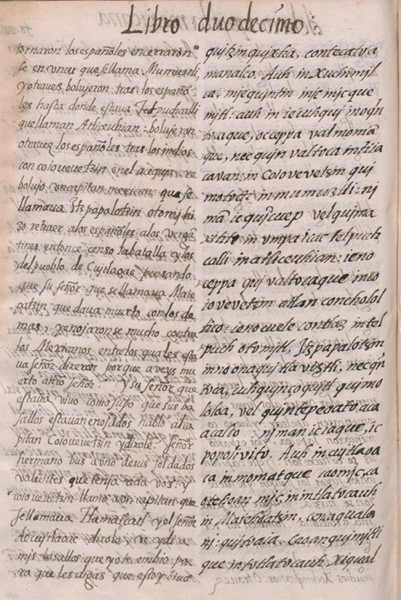 |
[Transcription of the Nahuatl (right-hand column) by James Lockhart:]
[f. 71v.] quitzinquixtia, contecato amanalco. Auh in Xuchimilca, miequintin inic micque mitl: auh in ie iuhqui in oq̄ntocaque, oc ceppa valmomāque, nec quinvaltoca in tiiacavan: in Coiovevetzin quimotocti in mumuztli: nimā ic quīcuep vel quimaxitito in vmpa icac telpuchcalli in atliceuhian: ie no ceppa quivaltocaque in coiovevetzin atlan conchololtico: ie no cuele contlaz in telpuchotomitl, Itzpapalotzin inn oonaqui tlaviztli, nec q̄ntoca, iuhquin çoquitl quimololoa, vel quintepeoato acaacalco:* niman ic iaque, ic popolivito.
Auh in cuitlaoaca in momatque ca omic, ca o tehoan mic, in intlatocauh in Maiehoatzin, cenca qualani: quitoaia, Ca oanquimictique in totlatocauh Xiqual
----------
*ACAACALCO. Read "acalco."
|
[Translation of the Nahuatl (right-hand column) by James Lockhart:]
and stationed them at Amanalco. And many people of Xochimilco died from arrows. And when they had chased them away, [the Spaniards] reformed, and then the warriors came pursuing them. Coyohuehuetzin took cover behind an altar platform. Then he turned them around and pushed them all the way to where the youths’ house stood in Atliceuhyan. Again [the Spaniards] came back pursuing Coyohuehuetzin, making him jump in the water. And then again the youth of Otomi rank, Itzpapalotzin, let go; he too had put on a device. Then he chased them, rolling them up like mud, scattering them into the boats. Then they left and disappeared.
And the people of Cuitlahuac, who thought that their ruler Mayehuatzin had died, that he had died along with the others, were very angry, and said, “You have killed our ruler.
[Translation of the Spanish (left-hand column) by James Lockhart:]
the Spaniards returned and shut themselves up in a cu called Momoztli. Again they turned and pursued the Spaniards to where the telpochcalli was, at the place called Atliceuhyan. The Spaniards again turned on the Indians with Coyohuehuetzin at the canal. A Mexica captain called Itzpapalotzin, an Otomi [in rank], turned and made the Spaniards retreat to the brigantines. Then the battle ceased.
The people from the settlement of Cuitlahuac, thinking that their lord named Mayehuatzin was dead along with the rest, grew very angry with the Mexica, among whom their lord was. They said, "Why have you killed our lord?" When their lord, who was alive, heard that his vassals were angry, he spoke to the captain Coyohuehuetzin, saying to him, "Lord brother, seek out one of your brave soldiers who has a strong voice." Coyohuehuetzin summoned a captain called Tlamayocatl, and the lord of Cuitlahuac told him, "Go and tell my vassals that I am sending you to tell them I am alive,
|
[Translation of the Nahuatl into Spanish by Fr. Bernardino de Sahagún; transcription of the Spanish (left-hand column) by James Lockhart:]
[f. 71v.] tornaron los españoles encerraronse en vn cu que se llama Mumuztli, y otra uez boluieron tras los españoles hasta donde estaua Telpuchcalli que llaman Atliceuhian: boluieron otra uez los españoles tras los indios con coioueuetzin en el acequia: reboluio vn capitan mexicano que se llamaua Itzpapalotzin otomi hizo retraer a los españoles a los vergātines: entonce censo la batalla
y los del pueblo de Cuitlaoac pensando que se señor que se llamaua Maieoatzin quedaua muerto con los demas, y enojaronse mucho contra los Mexicanos entre los quales estaua señor dixeron por que aveys muerto a n̄r̄o señor? y su señor que estaua viuo como supo que sus basallos estaua enojados hablo al capitan Coioueuetzin y dixole? Señor hermano bus* a vno de sus soldados valientes que tenia recia voz: y coioueuetzin llamo a vn capitan que se llamaua Tlamaiocatl y el señor de cuitlaoac dixole, ve y di a mis basallos que yo te embio para que les digas que estoy biuo
----------
*BUS. For "busca."
|
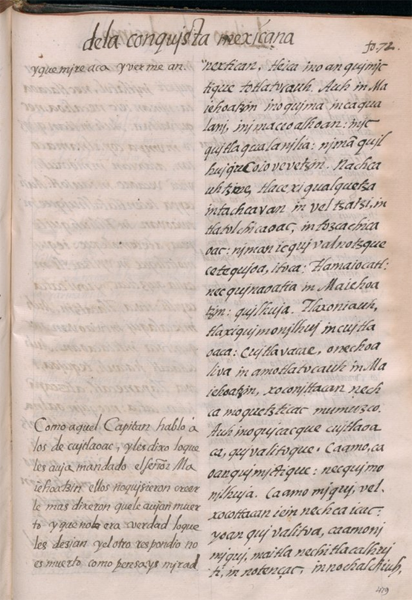 |
[Transcription of the Nahuatl (right-hand column) by James Lockhart:]
[f. 72r.] -nextican, tleica in oanquimictique totlatocauh. Auh in Maiehoatzin in oquima in ca qualani, in imaceoalhoan: inic quitlaqualanilia:*nimā quilhui in Coiovevetzin. Nachcauhtzine, tla ce xiqualquetza in tachcavan in vel tzatzi, in tlatolchicaoac, in tozcachicaoac: niman ic quivalnotzque ce tequioa, itoca: Tlamaiocatl: nec quinaoatia in Maiehoatzin: quilhuia. Tla xoniauh, tla xiquimonilhui in cuitlaoaca: Cuitlavacae, onechoaliva in amotlatocauh in Maiehoatzin, xoconittacan nechca moquetzticac mumuzco. Auh in oquicacque cuitlaoaca, quivalitoque. Ca amo, ca oanquimictique: nec quimonilhuia. Ca amo miqui, vel, xocottacan ie in nechca icac: yoan quivalitoa, ca amo nimiqui, ma itla nechitlacalhuiti, in notençac, in nochalchiuh,
----------
*QUITLAQUALANILIA. Although the form appears to be based on qualani ‘to become angry’, and probably qualania ‘to make someone angry’, I have not attained a secure analysis.
|
[Translation of the Nahuatl (right-hand column) by James Lockhart:]
Show him to us. Why have you killed our ruler?” But when Mayehuatzin found out his subjects were angry, [since it made him angry], then he said to Coyohuehuetzin, “My elder brother, please get one of the war leaders who can shout, who has a strong voice.” Then they summoned a seasoned warrior named Tlamayocatl, and Mayehuatzin gave him instructions, saying to him, “Go over there and say to the people of Cuitlahuac, ‘Oh people of Cuitlahuac, your ruler Mayehuatzin has sent me. Look at him standing over there at the altar platform.’” When the people of Cuitlahuac heard it, they replied, “No, you have killed him.” Then he said to them, “He is not dead. Look well at the person standing there.” And [Mayehuatzin] replied, “I am not dead; may they not let my lip pendant, my greenstones,
[Translation of the Spanish (left-hand column) by James Lockhart:]
and that they should look this way and they will see me." When that captain spoke to the people from Cuitlahuac and told them what the lord Mayehuatzin had ordered them, they would not believe him, but said that they had killed him and that what they were telling them was not true. The other answered, "He is not dead as you think; look
|
[Transcription of the Spanish (left-hand column) by James Lockhart:]
[f. 72r.] y que mire aca y verme an.
Como aquel Capitan hablo a los de cuitlaoac, y les dixo lo que les auia mandado el señor Maiehoatzin ellos no quisieron creerle mas dixeron que le auian muerto y que no era verdad lo que les dezian y el otro respondio no es muerto como pensays mirad
|
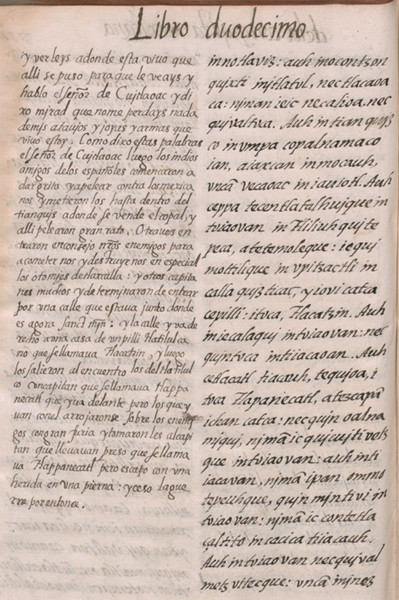 |
[Transcription of the Nahuatl (right-hand column) by James Lockhart:]
[f. 72v.] in notlaviz: auh in ocontzonquixti in itlatol, nec tlacaoaca: niman ie ic necalioa, nec quivaltoca. Auh in tianquizco in vmpa copalnamacoian, aiaxcan in mocauh, vncā vecaoac in iauiotl.
Auh ceppa tecentlatalhuique in toiaovan in Tliliuhquitepeca, atetemoleque: ie quimottilique in vpitzactli in calla quizticac, yiovi catca ce pilli: itoca, Tlacatzin. Auh in ie calaqui in toiaovan: nec quintoca in tiiacaoan. Auh ce tlacatl tiacauh, tequioa, itoca Tlapanecatl, atezcapā ichan catca: nec quinoalnamiqui, nimā ic quicuitivetzque in toiaovan: auh in tiiacavan, nimā ipan ommotepeuhque, quinmintivi in toiaovan: nimā ic contetlaçaltito in cacica tiiacauh. Auh in toiaovan nec quivalmetzvi: tecque: vncā in Inez
|
[Translation of the Nahuatl (right-hand column) by James Lockhart:]
and my device come to harm.” When he finished his statement, there was a clamor. Then fighting began, and [the enemy] came chasing [the Mexica]. In the marketplace, at Copalnamacoyan, the battle did not halt soon; it lasted a long time there.
Once our enemies, the people of Tliliuhquitepec and Atetemollan, had a conference about us. They had already seen a narrow roadway going among the houses, the passageway of a nobleman named Tlacatzin. When our enemies went in there, the warriors pursued them. And a warrior, a seasoned warrior named Tlapanecatl, from Atezcapan, came to face them. Then our enemies quickly seized him. But the warriors hurled themselves upon our enemies, shooting arrows at them, and then they made those who had captured the warrior let him go. But then our enemies hit him on the thigh (at the place where it is bled [in ritual bleeding]).
[Translation of the Spanish (left-hand column) by James Lockhart:]
and you will see him where he is, alive, for he placed himself there so you would see him." The lord of Cuitlahuac spoke and said, "Watch that you don't lose any of my adornments, jewels, and insignia, for I am alive." When the lord of Cuitlahuac said these words, the Indian friends of the Spaniards began to shout and combat the Mexica, and they forced them inside the tiánquiz where copal is sold; there the battle went on for a long while.
Again our enemies, especially the Otomi of Tlaxcala along with many other captains, consulted about attacking and destroying us. They decided to enter along a street that was next to where San Martin is now; the street went straight to the house of a Tlatelolca pilli called Tlacatzin. Then the Tlatelolca went out to meet them, a captain called Tlappanecatl going ahead, but those who went with him hurled themselves at the enemy with great fury, and the captain called Tlappanecatl was captured and was being carried away prisoner, but he escaped, with a wound in a leg. For then the fighting stopped.
|
[Paleografía de la columna a la izquierda por by James Lockhart:]
[f. 72v.] y verleys adonde esta viuo que allí se puso para que le veays y hablo el señor de Cuitlaoac y dixo mirad que no me perdays nada de mis atauios y joyas y armas que viuo estoy. Como dixo estas palabras el señor de Cuitlaoac luego los indios amigos de los españoles comencaron* a dar grita y a pelear contra los mexicanos y metieronlos hasta dentro del tianquiz adonde se vende el copal, y allí pelearon gran rato.
Otra uez entraron en consejo n̄r̄os enemigos para acometernos y destruirnos en especial los otomíes de tlaxcalla: y otros capitanes muchos y determinaron de entrar por vna calle que estaua junto donde es agora sanct m̄īn: y la calle yva derecho a vna casa de vn pilli Tlatilulcano que se llamaua Tlacatzin, y luego los salieron al encuentro los del tlatilulco vn capitán que se llamaua tlappanecatl que yua delante pero los que yuan con el arrojaronse sobre los enemigos con gran furia y tomaronles al capitán que lleuauan preso que se llamaua Tlappanecatl pero escapo con vna herida en vna pierna: y ceso la guerra por entonce.
----------
*COMENCARON. For: “començaron.”
|
 |
[Transcription of the Nahuatl (right-hand column) by James Lockhart:]
[f. 73r.] coaian:* niman ic iaque, ōmocacauhque in micali.
----------
*INEZCOAIAN. The translation demands that the intention is “inezçoaian,” not at all unlikely in view of the fact that omission of the cedilla is a fairly common phenomenon.
|
[Translation of the Nahuatl (right-hand column) by James Lockhart:]
Then they stopped fighting and left.
[Translation of the Spanish (left-hand column) by James Lockhart:]
(intentionally blank)
|
[Translation of the Nahuatl into Spanish by Fr. Bernardino de Sahagún; transcription of the Spanish (left-hand column) by James Lockhart:]
[f. 73r., la parte de arriba; sin dibujos y sin texto en español]
|
